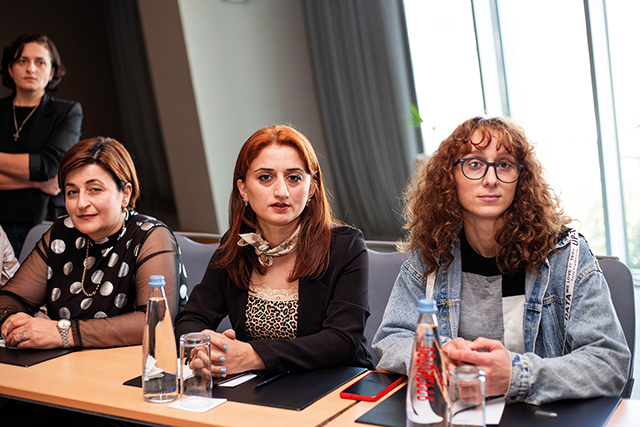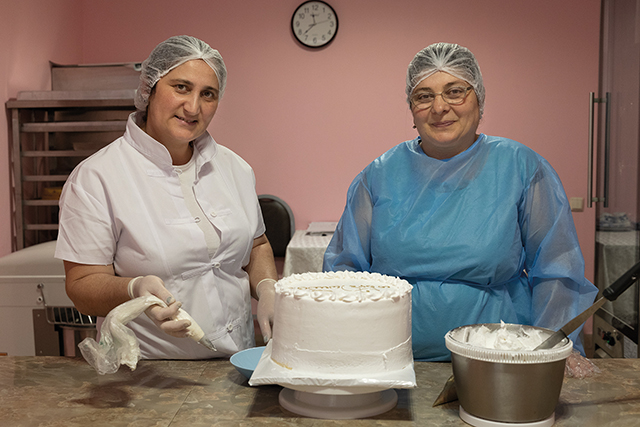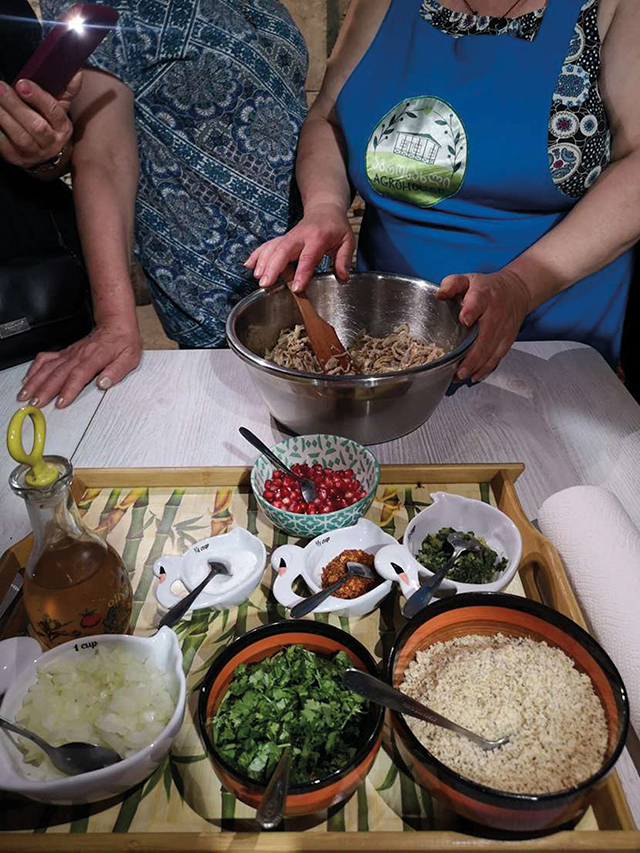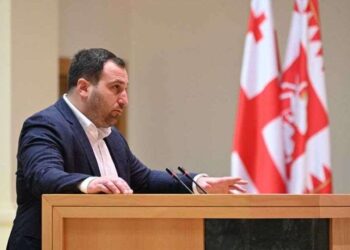
With the support of the EU and UNDP, within the ENPARD initiative, CENN has successfully rounded up its ‘Boosting Entrepreneurship Opportunities for Women through Promoting Women-led Gastronomic Tourism in Mountainous Adjara’ project, the main goal of which was to support the empowerment of local women in the social and economic directions. In addition, the project aimed to support sustainable development and green growth in highland Adjara by promoting the development of the gastronomic tourism sector.
“For the last couple of years, CENN has been actively contributing to the economic development of mountainous Adjara through its interventions in the local business market,” says Nana Janashia, CENN’s Executive Director. “We believe that empowering people living in the mountainous regions of Georgia is key to the equal socio-economic development of the country as a whole.”
Local women are the key drivers of the tourism sector
Within the framework of the project, entrepreneurs and women interested in entrepreneurial activities living in Khulo and Keda municipalities were trained in the direction of gastronomic tourism. 24 local women participated in the training course, which included interactive trainings, study visits, and practical workshops. The training modules covered gastronomic tourism as an important part of cultural tourism; the role of gastrotourism in the development of the country’s economy; gastrotourism and sustainable development; modern trends; best practices and challenges; gastronomy and the potential of Adjara; creation and development of gastro-tourism products; and using digital technologies to develop gastro-tourism products.

“Upper Adjara has become one of the most in-demand travel destinations in Georgia, promising as it does unique tourist experiences,” Janashia notes. “Mountainous villages of regions such as Keda and Khulo have a variety of gastro and wine tourism opportunities to offer, which is why it is essential to foster human capital development and tourism product diversification in order to fully utilize the local market potential.
The mountainous villages of regions such as Keda and Khulo have a variety of gastro and wine tourism opportunities to offer
“As part of the EU and ENPARD-funded project in Keda and Khulo, we are supporting local women to improve their entrepreneurial skills, as they are the key drivers of the tourism sector there,” Janashia adds.
“By empowering local entrepreneurs in diverse social and economic directions, as well as promoting the development of the gastronomic tourism sector in the region, we support the sustainable development and green growth of highland Adjara.”
“Development of mountainous, remote areas in Georgia has been a priority for the UNDP for decades,” Nodar Kereselidze, National Project Manager of the UNDP Project ‘Improving Rural Development in Georgia’ told us. “This is especially important for reaching out and addressing the pressing needs of the vulnerable population, youth, women, minorities and other disadvantaged. Under the ENPARD III program, one of the reasons to work in the Keda and Khulo municipalities was to complement and increase the impact of the activities of the Local Action Groups (LAGs) established with the support of the European Union. In the scopes of one of UNDP’s direct interventions, ‘Supporting Rural Women-Led Businesses,’ CENN was awarded with the contract with the aim to boost entrepreneurship opportunities for women through promoting women-led gastronomic tourism in mountainous Adjara.”

During the course of the project, women living in rural areas presented pilot ideas, of which the best six were selected. The authors of the best ideas were awarded grants to purchase the necessary equipment to implement their projects for the creation and development of local gastrotourism products.
The winners were, from Keda Municipality:
1. Naira Diasamidze – Baklava Masterclass
2. Guguli Chagalidze – Gastro Blog and Sunday School with “Zebo”
3. Indira Beridze – Cafe-Museum in Zvare
From Khulo Municipality:
4. Iamze Meladze – Improvement of the services of the guesthouse “Karati” in gastrotourism
5. Tsiuri Solomonidze – National Folklore and Gastronomy
6. Asmat Tunadze – Tklapi Production
GEORGIA TODAY heard from two of the many beneficiaries. The first, Asmat Tunadze from Festili, told us how she expects her project to benefit her region and Georgian gastrotourism in general.
“My winning project is ‘Development of Khulo Tklapi as a Gastrotourism Product.’ Tklapi is a fruit leather which you can roll up and eat,” she informs us. “By implementing this project, I will promote the development of Tklapi, well-known as part of Georgian cuisine, in particular Tklapi made in the highlands in Khulo, into a gastrotourist product.
“The implementation of my project will help the local population to solve the traditional problem of selling its surplus fruits, meaning many families will receive additional income. Of course, this will not happen through my project alone, or even just thanks to the Tklapi drying machine I bought for the project, but when people see the success of my project, others will start similar activities based on the possibilities my project opens.”
24 local women participated in the training course, which included interactive trainings, study visits, and practical workshops
We asked Asmat about the benefits taking part in this initiative had given her.
“As a person interested in entrepreneurship, the project gave me the opportunity to train in this direction,” she answered. “Within the framework of the project, I received trainings on the latest trends in gastrotourism, gastrotourism in the highlands of Adjara, and digital marketing, through which I can raise awareness.”
She tells us that, as part of the training, study visits were made to different parts of Georgia, where the beneficiaries discovered the successful activities of other entrepreneurs.
“It was also important for me, as a beginner entrepreneur living in Khulo municipality, to meet eight successful women from the nearby Keda municipality, with whom I’ll be able to cooperate in future.
“The benefit of participating in this project was not only my pilot idea winning, but the important knowledge and experience I gained from the trainings and study visits. Many thanks to CENN and the EU and UNDP. This project gave me an incentive and I hope to go on to be a successful entrepreneur in the future,” Asmat enthused.

Next to talk to us was Naira Diasamidze of ‘Adjarian Baklava,’ whose winning project aims to produce and popularize traditional Adjarian Baklava and local confectionery, as well as to entertain tourists.
“Within the framework of this project, I purchased equipment that allows me to provide high-quality service and comply with business standards in the making of Adjarian Baklava,” Naira told us.
“With financial support of the European Union’s ENPARD program, UNDP is actively supporting rural development needs throughout the country with a primary focus on improved governance and policymaking, as well as addressing economic, social and environmental challenges,” UNDP’s Nodar Kereselidze told GEORGIA TODAT. “In Adjara A/R, UNDP has supported the advancement of institutional and a strategic framework for improved rural service delivery, and provided direct interventions, among them business and green matching grants, smart villages, digital transformation, and strengthening urban-rural linkages. As a result, in Adjara A/R at this stage, among other outcomes, more than 200 new, permanent jobs have been created (46% for women), over 300 rural micro business have increased their capacities, 10 inter-territorial development partnerships have been formed, and over 150 households benefit from renewable energy/energy efficiency projects.”
By Katie Ruth Davies














